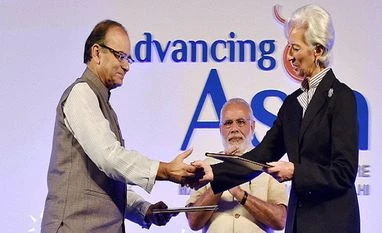IMF Managing Director Christine Lagarde on Saturday made out a case for Asian countries such as India to adopt a supportive monetary policy and growth-friendly fiscal measures to combat the impact of global economic woes.
Observing that India's star is shining bright, she suggested that the country should encourage private investment, make product markets more efficient and work towards improving infrastructure.
Also Read
RBI is scheduled to meet for its policy review on April 5 amid growing clamour for a rate cut.
The policy specifics, Lagarde said, would "vary across countries and according to circumstances. In all cases, however, it is safe to say structural reforms are key to boosting competitiveness, growth and jobs".
As for India, she put the focus on "enhancing the efficiency of product markets, encouraging private investment and improving infrastructure".
The focus of structural issues, she said, "will not only support Asia's near- and medium-term prospects, but secure the foundations on which to unlock the region's exciting future potential".
India, she stressed, "stands at a crucial moment in its history - with an unprecedented opportunity for transformation. Important reforms are already under way".
"Think, for example, of Make in India and Digital India. And with the promise of even more reforms to come, India's star shines bright," she said.
Among other things, the IMF chief also underlined the need for greater trade integration to support more sustained growth, especially for India and other South Asian countries.
"Multilateral trade liberalisation has the potential to be globally welfare-enhancing. If, however, progress at that level remains slow, comprehensive regional trade agreements can help lower tariff and non-tariff barriers, and incorporate new areas like services," Lagarde added.
She made a reference to the global economy facing a host of challenges such as volatile markets and capital flows, a sharp drop in commodity prices and escalating geopolitical tensions.
Lagarde said India can deliver nearly two-thirds of worldwide growth over the next four years despite a slowing momentum.
The world's fastest-growing large economy, she said, is on the verge of having the largest and youngest-ever workforce and, in a decade, is set to become the most populous country.
Earlier this year, Lagarde had said that quota and governance reforms came into effect that enhanced the representation of emerging Asian economies within 188 member countries.
"One consequence is that India now joins China and Japan among the Fund's top 10 shareholders," she said.
Lagarde further said that in about 10 days, India, Nepal and many other countries will be celebrating Holi, which heralds the coming of spring.
"I'm not suggesting we cover each other with colour or spray water, as is customary (we will leave that to children). But I do think today we should celebrate India's achievements, and Asia's achievements," she said, adding that "Asia has a lot to be proud of".
Stressing that making the most of Asia's dynamism is of great interest to the entire world, she acknowledged that Asia's rapid integration into the world economy has been one of the most striking global developments of the last generation.
In that relatively short time, she said, many countries across this vast and diverse region have achieved economic "miracles" .
For the past 25 years - the Asian crisis notwithstanding - the region's economy has grown by around six per cent a year. In the aftermath of the recent global financial crisis, Asia was a rare bright spot, Lagarde said.
She also spoke of empowering women - whether by enhancing girls' access to high-quality education, dismantling legal and logistical barriers to economic participation, or by making it more practical for women to combine a job and a family.
You’ve hit your limit of 5 free articles this month.
Subscribe now for unlimited access.
Already subscribed? Log in
Subscribe to read the full story →

Smart Quarterly
₹900
3 Months
₹300/Month
Smart Essential
₹2,700
1 Year
₹225/Month
Super Saver
₹3,900
2 Years
₹162/Month
Renews automatically, cancel anytime
Here’s what’s included in our digital subscription plans
Access to Exclusive Premium Stories Online
Over 30 behind the paywall stories daily, handpicked by our editors for subscribers


Complimentary Access to The New York Times
News, Games, Cooking, Audio, Wirecutter & The Athletic
Business Standard Epaper
Digital replica of our daily newspaper — with options to read, save, and share


Curated Newsletters
Insights on markets, finance, politics, tech, and more delivered to your inbox
Market Analysis & Investment Insights
In-depth market analysis & insights with access to The Smart Investor


Archives
Repository of articles and publications dating back to 1997
Ad-free Reading
Uninterrupted reading experience with no advertisements


Seamless Access Across All Devices
Access Business Standard across devices — mobile, tablet, or PC, via web or app



)
